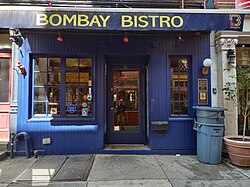Lanford Wilson was an American playwright. His work, as described by The New York Times, was "earthy, realist, greatly admired [and] widely performed." Wilson helped to advance the Off-Off-Broadway theater movement with his earliest plays, which were first produced at the Caffe Cino beginning in 1964. He was one of the first playwrights to move from Off-Off-Broadway to Off-Broadway, then Broadway and beyond.

Off-off-Broadway theaters are smaller New York City theaters than Broadway and off-Broadway theaters, and usually have fewer than 100 seats. The off-off-Broadway movement began in 1958 as part of a response to perceived commercialism of the professional theatre scene and as an experimental or avant-garde movement of drama and theatre. Over time, some off-off-Broadway productions have moved away from the movement's early experimental spirit.
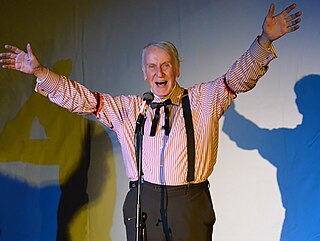
Robert Patrick was an American playwright, poet, lyricist, short story writer, and novelist.
Balm in Gilead is a 1965 American play written by American playwright Lanford Wilson.
Home Free! is a one-act play by American playwright Lanford Wilson. The play is among Wilson's earlier works, and was first produced off-off-Broadway at the Caffe Cino in 1964.
Magie Dominic is a Canadian poet, author, and artist who was born in Corner Brook, Newfoundland.
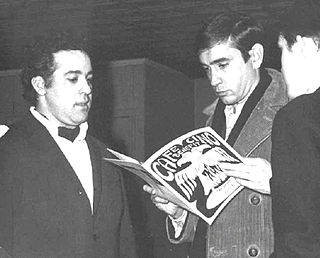
Joseph Cino, was an Italian-American theatre producer. The Off-Off-Broadway theatre movement is generally credited to have begun at Cino's Caffe Cino in the West Village of Manhattan.

Tom Eyen was an American playwright, lyricist, television writer and director. He received a Tony Award for Best Book of a Musical for Dreamgirls in 1981.
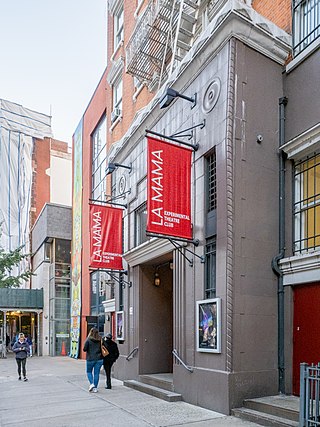
La MaMa Experimental Theatre Club is an Off-Off-Broadway theater founded in 1961 by African-American theatre director, producer, and fashion designer Ellen Stewart. Located in the East Village neighborhood of Manhattan in New York City, the theater began in the basement boutique where Stewart sold her fashion designs. Stewart turned the space into a theater at night, focusing on the work of young playwrights.

Theater for the New City, founded in 1971 and known familiarly as "TNC", is one of New York City's leading off-off-Broadway theaters, known for radical political plays and community commitment. Productions at TNC have won 43 Obie Awards and the Pulitzer Prize for Drama. TNC currently exists as a 4-theater complex in a 30,000-square-foot (2,800 m2) space at 155 First Avenue, in the East Village of Manhattan.
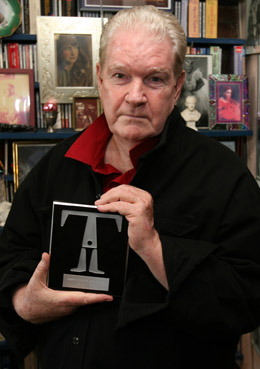
Doric Wilson was an American playwright, director, producer, critic and gay rights activist.
Michael Townsend Smith is an American playwright, theatre director, impresario, critic, and lighting designer.

Haralambos Monroe "Harry" Koutoukas was a surrealist playwright, actor and teacher. Along with Sam Shepard, Lanford Wilson, Doric Wilson, Tom Eyen and Robert Patrick, Koutoukas was among the artists who gave birth to the Off-Off Broadway theatre movement of the 1960s and 1970s.

George Birimisa was an American playwright, actor, and theater director who contributed to gay theater during the 1960s, the early years of the Off-Off-Broadway movement.
Theatre Genesis was an off-off-Broadway theater founded in 1964 by Ralph Cook. Located in the historic St. Mark's Church in-the-Bowery in the East Village of Manhattan, it produced the work of new American playwrights, including Lanford Wilson, Tony Barsha, Murray Mednick, Leonard Melfi, Walter Hadler, and Sam Shepard. Theatre Genesis is often credited as one of the original off-off-Broadway theaters, along with Joe Cino's Caffe Cino, Ellen Stewart's La MaMa Experimental Theatre Club, and Judson Poets Theatre.
The Madness of Lady Bright is a short play by Lanford Wilson, among the earliest of the gay theatre movement. The play was first performed at Joe Cino's Caffe Cino in May 1964.
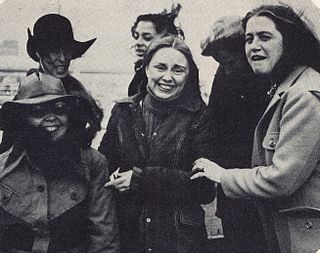
The Westbeth Playwrights Feminist Collective was a group of professional women playwrights in New York active from 1971 to 1975. They wrote and produced feminist plays and were one of the first feminist theatre groups in the United States to do so. The members' individual works had been produced at the Public Theater, La Mama, Joe Chaikin’s Open Theater, Caffe Cino, Circle Repertory Company, Mark Taper Forum, Lincoln Center, and New York Theater Ensemble.
Ludlow Fair is a one-act play by American playwright Lanford Wilson. It was first produced at Caffe Cino in 1965, a coffeehouse and theatre founded by Joe Cino, a pioneer of the Off-Off-Broadway theatre movement.

Jane Lowry was an American actress primarily known for her theater work on Broadway and regional theater, as well as her singular leading role in Alfred Sole's horror film Alice, Sweet Alice (1976).
Michael Warren Powell was an American artistic director, director, actor and designer involved in the Off-Off-Broadway movement, Off-Broadway and in the development of new American plays.
